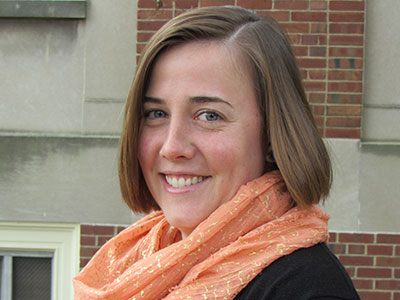Through the Seminary's Center for Adaptive and Innovative Ministry, Students Listen to Their Surroundings
When the Rev. Karen Rohrer describes what her goals are as director of the Center for Adaptive and Innovative Ministry, she answers, “I seek to grow people’s imagination for what faith communities could be and look like.” How does she do that? By helping people “listen to their surroundings—the people around them and the ground they stand on—so they can imagine the kind of church that is faithful to the gospel and plausible in the context of the community they’re convening.”
Where does Karen do that? For starters, here on the PTS campus. This year, seven M.Div. students are enrolled in our Emphasis in Forming New Faith Communities—seven students from five Christian traditions: Methodist, Presbyterian, United Church of Christ, Baptist, and the Free Church. Not only are these students denominationally diverse, but they’re also age- and experience-diverse.
“We have part- and full-time students; some of them have just graduated from college, some are second- and third-career men and women. In addition to taking courses, they gather for monthly lunches to discuss contemplative questions and hear from a practitioner in the church planting world,” Karen notes.
Also on campus, Karen cultivates ecclesial imagination with parishioners including through the previously offered Transformation and Revitalization Fellowship, a partnership with the Pittsburgh Presbytery. “This initiative—which grew out of our Church Planting and Revitalization Certificate program—is geared toward congregants to foster revitalization from within, though pastors are welcome, too” Karen explains. “The group of 23 people from the six churches in the cohort included participants from five Presbyterian churches and one Lutheran church. Interestingly, no real denominational differences have come up,” she notes. The cohort took a course on discernment with Christian spirituality and ministry professor the Rev. Dr. L. Roger Owens, followed by one on the mission-shaped church with missiology professor Dr. Scott Hagley. “It will be exciting to learn how these participants implement what they learn in the congregations to which they belong,” says Karen.
Karen recently welcomed our third cohort of students into the Graduate Cetificate in Church Planting and Revitalization, now called the Graduate Certificate in Adaptive and Innoative Ministry. “This group of 14 gathers from all around the country and includes first- and second-generation immigrants, business people, a farmer, a film blogger, pastors—a wide array that makes for rich conversation and interaction,” says Karen. “Participants come with a context to keep in mind for the work they’re doing in the program. For some, that’s an established church; others want to plant a church; still others have started a faith community that may grow into a church. Over 15 months, they meet as a cohort for classes three times in Pittsburgh, then once in each of two other cities—this year, San Francisco and Chicago—to get a picture of the different kinds of influences and diversity present in different contexts. This deep-dive into place is integral to the goal of the certificate program, which is meant to help people become attuned to the Holy Spirit’s movement in their lives.”
Karen notes that of the 15 people who just finished the program, 11 ended up changing their work while pursuing the certificate. “It’s a transition-rich program,” she observes, “one that teaches people how to be ready for what God has for them when it comes along.”

